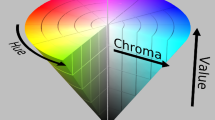Abstract
This paper generalizes and extends the theory of conceptual spaces as originally proposed by Gardenförs (Conceptual spaces. Cambridge, MA: MIT Press) to provide further geometric representations of both concepts and object observations within a multi-dimensional fuzzy space corresponding to a subset of a unit hypercube. With these representations, we are able directly to calculate normalized scalar measures both of the similarity of two different concepts and of the degree to which an observation satisfies a concept description, and thus to perform inferences with respect to situational assessments and predictions. This capability is directly relevant to the implementation of Levels 2 and 3 data fusion functions using our approach.
Similar content being viewed by others
References
J. Aisbett G. Gibbon (2001) ArticleTitleA general formulation of conceptual spaces as a meso level representation Artificial Intelligence 133 189–232 Occurrence Handle0992.68195 Occurrence Handle1867502 Occurrence Handle10.1016/S0004-3702(01)00144-8
P. Gardenförs (2000) Conceptual spaces MIT Press Cambridge, MA
Gardenförs P. (2004). Making the semantic web more semantic. In: Varzi A., Vieu L. (eds). Formal ontology in information science (pp. 19–36). IOS Press.
B. Kosko (1992) Neural networks and fuzzy systems Prentice-Hall Englewood Cliffs, NJ Occurrence Handle0755.94024
B. Kosko (1997) Fuzzy engineering Prentice-Hall Upper Saddle River, NJ Occurrence Handle0895.94015
M. Minsky (1975) A framework for representing knowledge P.H. Winston (Eds) Psychology of computer vision McGraw Hill New York, NY
Raubal, M. (2004). Formalizing conceptual spaces. In Formal ontology in information systems, FOIS 2004, Torino, Italy (available at http://www.ifgi.uni-muenster.de/~raubal/Publications/RefConferences/CogSemInterop_FOIS04_final.pdf).
Rickard, J., & Yager, R. (2006). Hypercube graph representations and fuzzy measures of graph properties. IEEE Transactions on Fuzzy Systems (to appear).
J. Rickard R. Yager W. Miller (2005) ArticleTitleMountain clustering on non-uniform grids using P-trees” Journal of Fuzzy Optimization and Decision Making 4 87–102 Occurrence Handle1078.68722 Occurrence Handle2129598 Occurrence Handle10.1007/s10700-004-5866-5
S. Stubberud P. Shea D. Klamer (2003a) ArticleTitleData fusion: A conceptual approach to Level 2 fusion (situational assessment) Proceedings of SPIE 5096 455–462
S. Stubberud P. Shea D. Klamer (2003b) ArticleTitleMetrics for Level 2 fusion association Proceedings of sixth international conference of information fusion 2 1180–1186
R. Yager J. Kacprzyk (1997) The ordered weighted averaging operators – Theory and application Kluwer Academic Publishers Boston
D. Yu A. Zhang (2003) ArticleTitleClusterTree: Integration of cluster representation and nearest-neighbor search for large data sets with high dimensions IEEE Transactions on Knowledge and Data Engineering 15 IssueID5 1316–1337 Occurrence Handle1932673 Occurrence Handle10.1109/TKDE.2003.1232281
Zaharia, M., Leon, F., & Gâlea, D. (2003). On finding an optimized categorization in conceptual spaces using genetic algorithms. Bulletin of Technical University of Iaşi, tome XLIX (LIII), fasc. 1–4, 111–120, ISSN 1220–2169.
Author information
Authors and Affiliations
Corresponding author
Rights and permissions
About this article
Cite this article
Rickard, J.T. A concept geometry for conceptual spaces. Fuzzy Optim Decis Making 5, 311–329 (2006). https://doi.org/10.1007/s10700-006-0020-1
Issue Date:
DOI: https://doi.org/10.1007/s10700-006-0020-1




